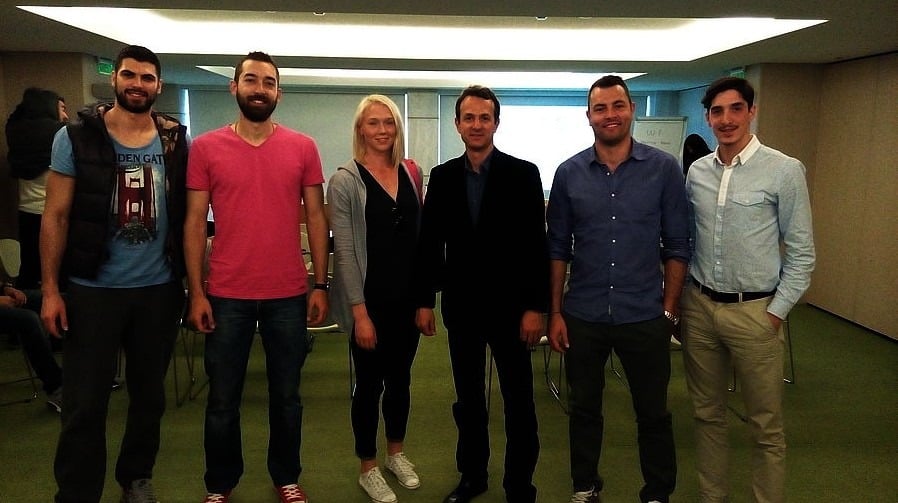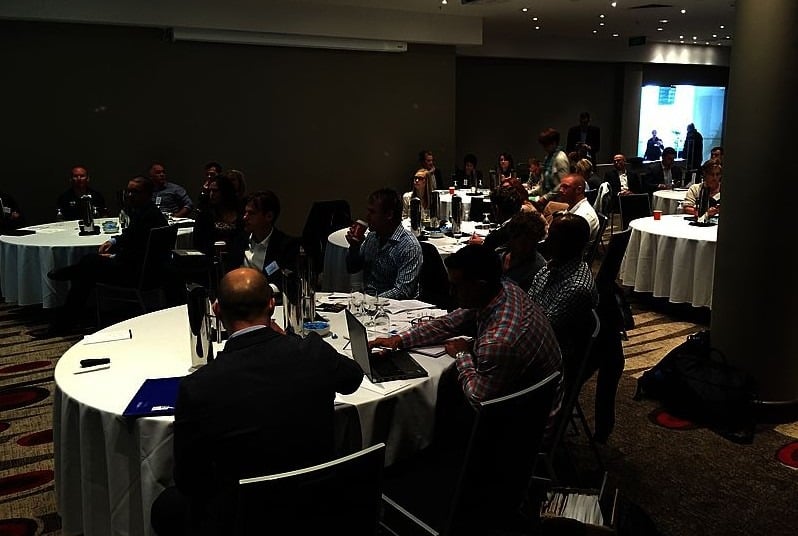
Jun 28, 2015
28 player associations from around Europe gathered in Bilbao – Spain- to discuss about matchfixing and prevention.
During 3 days, 38 members from 28 different players associations were together in Bilbao to receive an education package delivered by EU Athletes and his partners, RGA, ESSA, EGBA and Love Media.
#PROtectintegrity2 is the continuation of the preparatory action in the field of sport supported by the European commission in 2012. The aim of this project is educate and teach players on the risks of match-fixing.
Tutor training delivered directly in the locker room by EU Athletes members is the key to the success of this program. Player associations will now add a social media campaign run by Love Media to the face to face education .
The goal of EU Athletes is to make sure that all professional and top elite athletes are aware of the rules in their country and in their own sport.

Jun 8, 2015
This paper presents the agreed position of EU Athletes and UNI Europa on Good Governance according to the agenda of the EU Expert Group and the topic of Major Sporting Events.
EU Athletes is strongly supportive of greater sustainability, higher protection standards of human and workers’ rights and overall better governance of both the awarding and running of mega sporting events to the mutual benefit of the athletes, sport industry and communities in the host cities/countries.
Recent developments have once again highlighted the need for good governance to be integral to the running of sports federations, particularly with regards to the awarding of sporting events and financial transparency. It is essential that sports federations are subject to international and national laws on corruption and bribery. These need to be effectively enforced. We do believe that equal opportunity is relevant to good governance. Therefore, major sport events should be an unmissable opportunity for women athletes to develop their full potential in a genderfriendly
environment.
MSEs provide a perfect context for increasing female athletes’ visibility, and bringing their issues to the centre of attention. That may only be conceivable if sustainable gender equality policies are established and strictly respected leading to concrete changes. We are also convinced that any economic legacy from major events must be built on sound and responsible economic and business policies with regards to accepted frameworks such as the UN Global Compact 10 guiding principles.
The high profile and monopolistic position of the sports federations is cause to require higher standards of governance, not least importantly the recognition of athletes, who participate in mega sport events, as workers. In many sporting events athletes are being deprived from recognition of their employee status, despite earning significant income, both directly and indirectly by playing or participating in their sports during those events and providing their labour in subordination to sport
organizations or clubs.
In this regard we would like to make the following recommendations for the deliverable related to “awarding of Major Sport Events, especially in relation to democracy, human rights and labour rights “ of the Expert Group:
Regarding athletes’ rights:
There needs to be a specific section on athletes’ rights within the recommendations of the Expert Group. This should include :
- The collective and individual workers’ and human rights of athletes must be respected during the major sport events
- Sport organization may not deprive the athletes of their right to commercialize their IPR during and around the event without compensation. Athletes’ contribution to the commercial value should allow them to significantly participate in the generated revenue.
- The athletes’ freedom of speech and the freedom of association in and around the events may not be infringed.
- The provision of a safe, viable (ie social security provisions) and protected working
- environment for athletes should be recognized as an absolute duty of the competition organizer *.
* Study on epidemiology of injury in sport olympics, 2008, 2010, 2012. At least 11% of the athletes incurred an injury during the olympic games and 7% of the athletes’ an illness. Future initiatives should include the development of preventive measures tailored for each specific sport and the continued focus among sport bodies to institute and further develop scientific injury and illness surveillance systems.
For sporting organization:
Given the monopolistic nature of the sport movement it must be subject higher standards of governance, amongst others with regards to participation in collective bargaining, revenue sharing, transparency, sustainability, democracy, fundamental rights and anti-corruption. There is an urgent need for appropriate checks and balances to overcome the potential for exploitation of a dominant market position. The recognition of trade unions must be the number one recommendation.
- The stakeholders who contribute to the economic base of a sport must be recognised and a well-governed sport organisation must be accountable to their stakeholders including the athletes
- Well governed sports organisation respect the basic individual and collective rights of the athletes, including the freedom of association and embrace partnership with them through their professional association and collective bargaining
- Improve transparency and democracy: corruption and conflicts of interest in sport have a substantial and negative impact on the position of sports people, all actors in sport must tackle this problem and the Commission has an important role to play in promoting European values within international sports federations.
- Elimination of all forms of forced and compulsory labour and of the discrimination in respect of employment and occupation.
Participation in Olympic Games, World Championships or other major sporting events is an ultimate goal of most of athletes. It is essential to point out that organizing an event in breach of basic human rights principles goes not only against the values of sport but also against personal values of athletes.
The lack of employment stability and the sanctions imposed by some federations in the case of an athlete’s non-participation with his national team, are forcing them to compete in those events with no other options. No objection is possible since these major events are their only means of subsistence and the only places where their sport results may allow them to gain money afterwards. This abuse of a dominant market position strongly infringes with athletes’ economic rights.

Apr 25, 2015
Our member HPVPA, has just informed us of the renewal of their Board. Here is the list of their full board.
President: Psarras Athanasios
1st Vice President: Pantaleon Sotiris
2nd Vice President: Papafotiou Athina (Female)
Secretary General: Dimitriadis Anestis
Secretary Assistant: Giota Ekaterina (Female)
Treasurer: Stefanou Giorgos
Member: Terzis Athanasios
Member: Kanellos Makis
Member: Papadimitriou Thanos
During the last months HPVPA had starting the process of refreshing their Association new web site – (www.pasap.eu), new logo, new moto.

Apr 14, 2015
For the second consecutive year EU Athletes is launching the #EUSportIntegrityDay on April 15 to raise awareness amongst athletes on the risks of matchfixing.
Social medias are a key element of the education of athletes on the potential risks of matchfixing.
I order to promote the #PROtectIntegrity campaign launched in 2012 with the help of EGBA, RGA and ESSA with a cofinancing of the European Commission under the preparatory actions in the field of sport. EU Athletes members are using on the 15th of April social medias to promote a successful and unique education programme for athletes.
For Jean-François Reymond (EU Athletes General Secretary) “Educating athletes on the risks of match fixing has always been a high priority for the associations member of EU Athletes. We have successfully trained the trainers and delivered direct face to face education for more than 14.000 athletes in Europe in 2014. With the use of social medias, #EUSportIntegrityDay becomes the continuation of our programme. We want to make sure that all the athletes in Europe are aware of the rules in their sport and sport stakeholders are understanding the benefits of a broader communication on all channels to effectively protect the integrity of sport”.
Looking forward to expand this programme under ERASMUS+ EU Athletes is now counting on the sport movement to be more involved and accept April 15 as #EUSportIntegrityDay.

Apr 6, 2015
During the last few days, some EU Athletes members have gathered in Melbourne together with other colleagues from player Unions from around to world to participate in the first ever international Player Development Manager conference, organized by UNI world Athletes.
The purpose of the conference was to share knowledge and best practices on the best way to support dual career of athletes and the role of PDM (Player Development Manager)
From qualifications of PDM, to measurement of success and effectiveness, the sessions targeted a large range of issues in indoor the improve the support to players.
EU Athletes used the opportunity of the conference to distribute amongst participants his latest Guidelines developed during the course of his last EU financed project (Preparatory action in the field of sport)
Using the term “maximizing the athletes’ time in the sport” instead of “career transition” is one example about how the players association for Australian football players (AFL) has reached the players more easily to help them understanding the importance of planning for the future.
Participating organizations have been from Australia, New Zeland, Japan, Slovenia, UK, Ireland and Sweden. More experienced organizations have generously been sharing documentation and expertise to those ones who has started more recently.
By: Ana Soderlind





